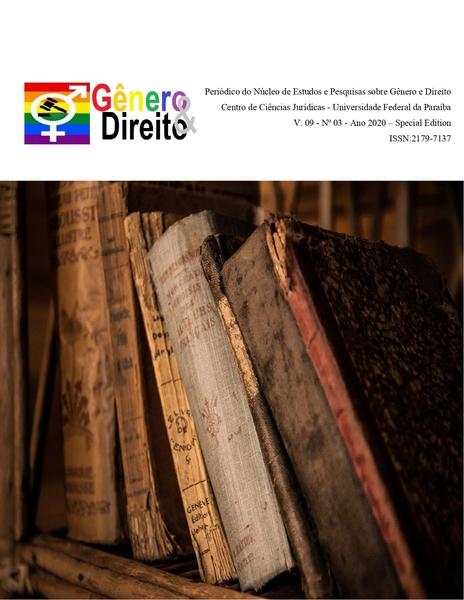ILLEGAL RECEIPT OF A CREDIT:
FORMAL LEGAL ANALYSIS, QUALIFICATION AND JUDICAL PRACTICE
Palavras-chave:
illegal receipt of a credit, illegal receipt of a state special-purpose loan, credit fraud, misappropriation of budget funds.Resumo
The aim of this article was to identify legislative and law enforcement problems, to formulate scientifically sound legal positions regarding the doctrinal interpretation of the criminal legislation of the Russian Federation and to improve practical application through a comprehensive legal study of the corpus delicti associated with the illegally receipt of a credit or a credit fraud. The theoretical basis for this research was the works of scientists and practicing lawyers who thoroughly analyzed the issues of crimes in credit and finance. The methodological basis included systemic, comparative legal, formal legal and sociological research methods. The empirical basis of the study was the open data of Russian ethic and legal statistics on credit frauds, the results of criminological and criminal law studies, the directives of the Supreme Court of the Russian Federation on judicial practice, the results of the analysis of criminal cases on credit crimes. Based on the conducted research, generalization of the materials of judicial practice, the authors identified the specifics of the target, object, subject, objective and subjective sides of the illegal receipt of a credit, qualification and delineation from related corpora delicti. The formulated provisions and conclusions can be used for developing proposals on improving legislation on the constructive elements of the illegal receipt of a credit and a credit fraud. The research results can be used for accurate qualification of committed socially dangerous acts within criminal law to ensure the uniform application of legal norms concerning the liability for the illegal receipt of a credit by the pre-trial investigation bodies and courts.
Downloads
Referências
Volzhenkin, B. V. (2007). Economic Crimes under the Criminal Law of Russia. St. Petersburg: Yuridichesky Tsentr Pres.
Volkov, I. K. (2004). A loan fraud: criminal law and criminological characteristics: Dissertation of a Candidate of Legal Sciences. Rostov-on-Don.
Gladkikh, V. I. (2015). Some issues of qualification and application of the norm of liability for a loan fraud. Russian Investigator, 3, 26-32.
Klepitsky, I. A. (2005). System of Economic Crimes. Moscow: Statut.
Commentary on the Criminal Code of the Russian Federation. (2010). (Ed.) A. Chuchaev, 2nd ed., revised and amended. Moscow: Infra-M, Contract.
Koshaeva, T. O. (1998). Crimes in the field of economic activity (brief commentary on the articles of the Criminal Code of the Russian Federation). Law and Economics, 6, 91-93.
Lapshin, V. F. (2003). On the implementation of the provisions of Article 176 of the Criminal Code of the Russian Federation. In Pressing Issues of Differentiation of Responsibility and Legislative Methods in Criminal Law and Process. Collection of Scientific Articles. Yaroslavl: Publishing House Yaroslavl University, pp. 84-99.
Larichev, V. D., Abramov, V. Yu. (1998). Problems of improving the criminal law related to creditors rights’ protection. State and Law, 8, 98-103.
Leshina, T. E. (2005). The subject of criminal offence of budget funds misuse. Financial Law, 10, 30-34.
Lopashenko, N. A. (2006). Economic Crimes: The Author’s Commentary on the Criminal Law (Section 8 of the Criminal Code of the Russian Federation). Moscow: Volters Clover Publishing House.
Lukyanov, V. A., Masharov, G. S. (2005). Some issues of qualification of credit crimes. Banking Law, 6, 22-24.
Lyaskalo, A. N. (2014). Interpretation of blanket elements Article 176 of the Criminal Code. Criminal Law, 6, 56-64.
Lyaskalo A.N. (2014). Socially dangerous consequences of illegal obtaining a loan. Legality, 10, 36-42.
Naumov, A. V. (2006). Application of the Criminal Code of the Russian Federation: Commentary on Judicial practice and Doctrinal Interpretation. Moscow: Volters Clover Publishing House.
Nudel, S. L. (2015). Specifics of credit fraud qualification. Russian Investigator, 7, 42-46.
Pashintseva, U. V. (2008). The objective side of a loan fraud (Part 1 of Article 176 of the Criminal Code of the Russian Federation). Russian Investigator, 4, 11-13.
Petrukhina, O. A. (2011). The concept of state special-purpose credit as a subject of a crime under Part 2 of Article 176 of the Criminal Code. Proceedings of the Tula State University, Economic and Legal Sciences, 2(2), 160-164.
Resolution of the Plenum of the Supreme Court of the Russian Federation of November 30, 2017 N 48 “On judicial practice in cases of fraud, misappropriation and embezzlement”. (2018). Bulletin of the Supreme Court of the Russian Federation, 2.
Rusanov, G. A. (2011). Economic Crimes: A Textbook. Moscow: Prospekt.
Sapozhkov, A. A. (2002). Credit offenses. A loan fraud and malicious evasion of satisfaction of accounts payable. St. Petersburg: Yuridichesky Tsentr Pres.
Selivanovskaya, Yu. I. (2009). Controversial issues of criminal liability for a credit fraud. Advances in Current Natural Sciences, 4, 15-17.
Shadrina, O. V. (2008). Criminal liability for banking and credit crimes under the criminal law of the Russian Federation. Dissertation of a Candidate of Legal Sciences. Moscow.

